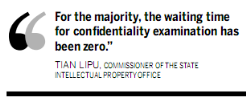Economy
Foreign firms in quandary over new secrets clause
By Wang xin (China Daily)
Updated: 2010-05-05 11:16
 |
Large Medium Small |
The purpose of the amending is to further standardize applications for foreign patents, forestall leaking of state secrets and protect major economic and social interests, Dong noted.
Inventions that affect national security will be administrated in accordance with the State Secret Law, she said.

Inventions and utility models subject to the new amendment are those that were primarily or materially created in the nation, Dong explained.
In the case of a joint project with participants from different nations, the key point is whether the major creative contribution came from China or abroad, rather than nationality of project participants.
Commissioner Tian noted that instead of the examination regulation itself - a globally common practice - foreign investors are more concerned about the confidentiality screen processing period, which might have an impact on establishing priority rights in patents.
Since the new law came into effect last October, more than 98 percent of applications for overseas inventions and utility models have been granted.
A large proportion of the remaining 1.3 percent are still being processed, Tian said. "Of those remaining, I believe that grant rate will surpass 50 percent."
"So the number of non-granted patents due to national security would be very limited," he said.
"For the majority, the waiting time for confidentiality examination has been zero."
Most remaining applications still being processed will have results in two or three weeks, Tian said, with only a few that may last longer, yet still within the regulated time.
Processing efficiency is expected to further improve, he added.
SIPO holds such a meeting for briefing and exchange with foreign-related businesses and other organizations at least once a year. Fifty delegates from foreign organizations and multinationals attended the meeting this year.













